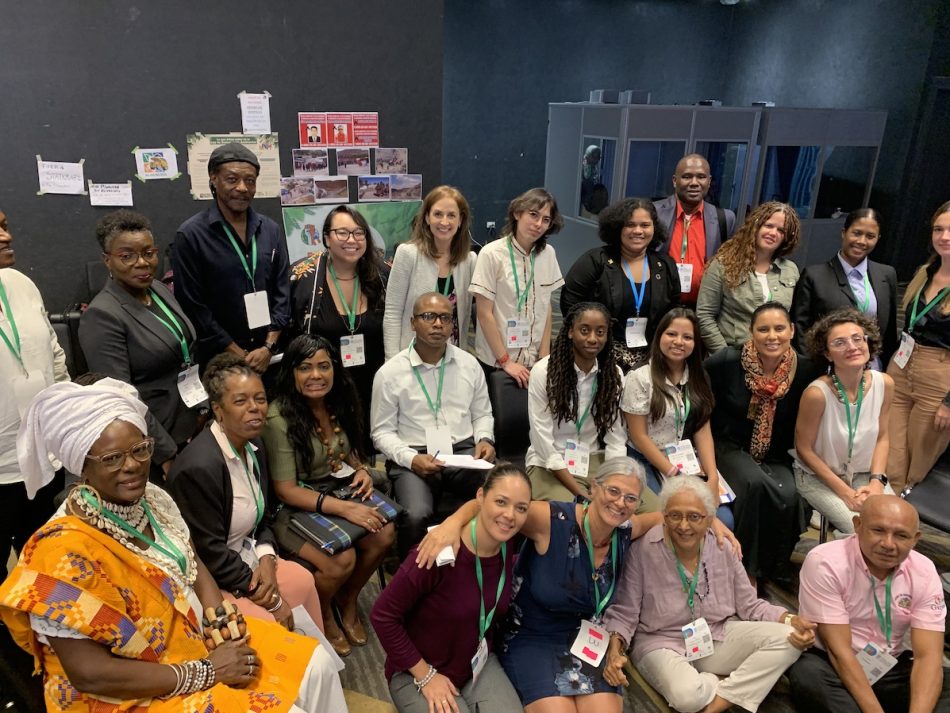CANARI supports call for urgent protection for environmental defenders in Latin America and the Caribbean

Caribbean representatives and others at the Forum in Panama developing recommendations for the Action Plan. Credit: CANARI
Port of Spain, October 11, 2023: The Caribbean Natural Resources Institute (CANARI) supports calls by the Elected Representatives of the Public of the Escazú Agreement for Governments of Latin America and the Caribbean to develop an ambitious plan to urgently address the serious threats faced by environmental defenders in the region. This call was made at the Second Forum on Human Rights Defenders in Environmental Matters in Latin America and the Caribbean, held in Panama 27-28 September 2023 and attended by over 400 participants from across the region.
Executive Director of CANARI, Nicole Leotaud, is serving as one of the six Elected Representatives of the Public of the Escazú Agreement. She emphasised that, “Caribbean Governments must urgently address the growing threats to environmental defenders in our region who face harassment, intimidation, discrimination and marginalisation. We need to put strong protections in place before the problem escalates to what we are seeing in Latin America, which is the most dangerous region in the world for people trying to defend their rights to a clean and healthy environment. We cannot be complacent and ignore the increasing threats faced by environmental defenders in Jamaica, Guyana, Belize, Trinidad and Tobago, Grenada, Antigua and Barbuda, Suriname and elsewhere.”
Development of this action plan to protect environmental defenders is a key commitment under the United Nations Regional Agreement on Access to Information, Public Participation and Justice in Environmental Matters in Latin America and the Caribbean (the Escazú Agreement). This regional treaty protects the human right to a healthy environment and is the only international agreement that explicitly recognises the need to protect environmental defenders. So far 15 countries from Latin America and the Caribbean are Parties to the Agreement – Antigua and Barbuda, Argentina, Belize, Bolivia, Chile, Ecuador, Grenada, Guyana, Mexico, Nicaragua, Panama, St. Vincent and the Grenadines, Saint Lucia and Uruguay. The public continues to advocate that other Governments immediately join to demonstrate their commitment to good environmental governance and environmental rights.
The Elected Representatives of the Public of the Escazú Agreement are supporting environmental defenders and other members of the public to work with Governments over the coming months to ensure that a strong Action Plan will be adopted at the meeting of the Conference of Parties to the Escazú Agreement, which will be held in Chile from 22-24 April 2024. The public is demanding that Governments adopt an ambitious Action Plan at this meeting and do not delay.
The six Elected Representatives of the Public of the Escazú Agreement are mandated to encourage and facilitate public participation and to represent the public in processes under the Escazú Agreement. In this role, they held a preparatory meeting for the public on 26 September to help environmental defenders and their supporters to identify their key messages and prepare for dialogue in the Forum. This was attended by over 200 participants, representing the diversity of environmental defenders.
Key priorities raised by the public included the need for a comprehensive assessment of the different types of environmental defenders, the challenges they face and the barriers and threats to their important work. Recommendations emphasised the need to provide capacity building and financing for environmental defenders themselves, not just governments. The Action Plan also needs to lay out strong mechanisms which can be tailored to suit specific national and local contexts and needs of environmental defenders. Mechanisms must be developed with environmental defenders to ensure that they have a voice in ensuring that they will be effective.
The public also called for the Action Plan to include strong accountability and reporting mechanisms, with specific indicators which will enable the public to track progress and hold Governments responsible.
The threats to human rights defenders on environmental matters are varied and targeted at a wide cross section of interests. Participants at the Forum included indigenous people and Afro-Descendants determined to protect their territories and cultures, local communities whose health and livelihoods are being impacted from mining and other developments, citizens worried about risks from development of the oil and gas sector and hydroelectric power, journalists threatened for investigating corruption driving development decisions which will harm nature and people, communicators harassed for raising awareness about environmental issues, lawyers intimidated and marginalised for pursuing environmental litigation, NGO leaders publicly ridiculed and threatened for asking their governments to follow national laws and regulations, youth calling for climate justice and women facing additional gender-based risks and threats while in defence of the environment.





